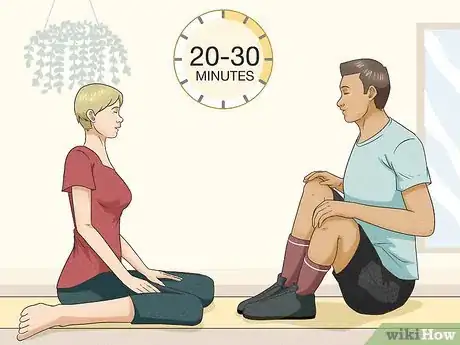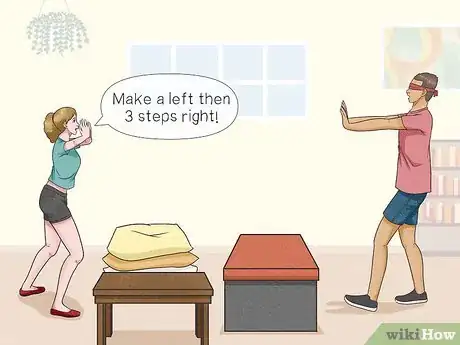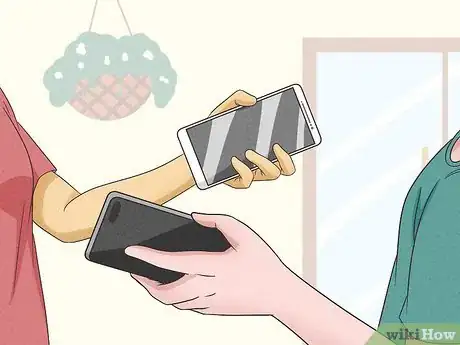This article was co-authored by Kelli Miller, LCSW, MSW and by wikiHow staff writer, Kira Jan. Kelli Miller is a Psychotherapist based in Los Angeles, California. Kelli specializes in individual and couples therapy focusing on relationships, depression, anxiety, sexuality, communication, parenting, and more. Kelli also facilitates groups for those struggling with alcohol and drug addiction as well as anger management groups. She is the author of “Professor Kelli’s Guide to Finding a Husband” and the award-winning and best-selling book “Thriving with ADHD”. Kelli co-hosted an advice show on LA Talk Radio and is a relationship expert for The Examiner. She received her MSW (Masters of Social Work) from the University of Pennsylvania and a BA in Sociology/Health from the University of Florida.
There are 17 references cited in this article, which can be found at the bottom of the page.
This article has been viewed 43,583 times.
When you’ve gone through a rough patch with your partner, it might feel hard to remember the connection that originally drew you to that person. Fortunately, rebuilding trust through vulnerability, honesty, and meaningful communication can help you and your relationship move to a healthier place.
Here are 15 activities that will help rebuild trust between you and your partner.
This article is based on an interview with our relationship expert, Kelli Miller, licensed pyschotherapist and award-winning author. Check out the full interview here.
Steps
Expert Q&A
-
QuestionHow do you build trust back in a relationship after lying and cheating?
 Kelli Miller, LCSW, MSWKelli Miller is a Psychotherapist based in Los Angeles, California. Kelli specializes in individual and couples therapy focusing on relationships, depression, anxiety, sexuality, communication, parenting, and more. Kelli also facilitates groups for those struggling with alcohol and drug addiction as well as anger management groups. She is the author of “Professor Kelli’s Guide to Finding a Husband” and the award-winning and best-selling book “Thriving with ADHD”. Kelli co-hosted an advice show on LA Talk Radio and is a relationship expert for The Examiner. She received her MSW (Masters of Social Work) from the University of Pennsylvania and a BA in Sociology/Health from the University of Florida.
Kelli Miller, LCSW, MSWKelli Miller is a Psychotherapist based in Los Angeles, California. Kelli specializes in individual and couples therapy focusing on relationships, depression, anxiety, sexuality, communication, parenting, and more. Kelli also facilitates groups for those struggling with alcohol and drug addiction as well as anger management groups. She is the author of “Professor Kelli’s Guide to Finding a Husband” and the award-winning and best-selling book “Thriving with ADHD”. Kelli co-hosted an advice show on LA Talk Radio and is a relationship expert for The Examiner. She received her MSW (Masters of Social Work) from the University of Pennsylvania and a BA in Sociology/Health from the University of Florida.
Psychotherapist Communication is key! You need to vocalize exactly how you're feeling after the breach of trust—that you're hurt, sad, and angry. If you have questions about why the infidelity occurred, feel free to ask your partner directly. As tough as the situation may be, it can actually be a really nice opening for a deeper and more connected relationship.
Communication is key! You need to vocalize exactly how you're feeling after the breach of trust—that you're hurt, sad, and angry. If you have questions about why the infidelity occurred, feel free to ask your partner directly. As tough as the situation may be, it can actually be a really nice opening for a deeper and more connected relationship.
References
- ↑ https://greatergood.berkeley.edu/article/item/hands_on_research
- ↑ https://hbr.org/2009/06/rethinking-trust
- ↑ https://www.loveisrespect.org/resources/trust-exercises-to-try-with-your-partner/
- ↑ https://www.eneuro.org/content/6/1/ENEURO.0284-18.2019
- ↑ https://psychcentral.com/lib/mindfulness-in-relationships-breathing-together
- ↑ https://greatergood.berkeley.edu/article/item/how_gratitude_changes_you_and_your_brain
- ↑ https://www.loveisrespect.org/resources/trust-exercises-to-try-with-your-partner/
- ↑ https://www.loveisrespect.org/resources/trust-exercises-to-try-with-your-partner/
- ↑ https://www.nbcnews.com/better/lifestyle/how-repair-your-relationship-after-someone-cheats-ncna980776
- ↑ https://www.loveisrespect.org/resources/trust-exercises-to-try-with-your-partner/
- ↑ https://www.psychologytoday.com/us/blog/in-it-together/201703/date-night-not-luxury-necessity
- ↑ https://www.psychologytoday.com/us/blog/friendship-20/201812/7-ways-build-trust-in-relationship
- ↑ https://www.psychologytoday.com/us/blog/intimate-portrait/201704/how-rebuild-trust-when-betrayal-comes-light
- ↑ Kelli Miller, LCSW, MSW. Psychotherapist. Expert Interview. 11 June 2020.
- ↑ https://www.npr.org/transcripts/406455947
- ↑ https://www.insider.com/cheat-on-partner-affair-ask-yourself-these-questions-2019-4
- ↑ https://www.mayoclinic.org/healthy-lifestyle/adult-health/in-depth/infidelity/art-20048424
- ↑ https://hbr.org/2013/03/how-to-give-a-meaningful-apolo
- ↑ Kelli Miller, LCSW, MSW. Psychotherapist. Expert Interview. 11 June 2020.
- ↑ https://www.psychologytoday.com/us/blog/friendship-20/201812/7-ways-build-trust-in-relationship
- ↑ Kelli Miller, LCSW, MSW. Psychotherapist. Expert Interview. 11 June 2020.
- ↑ https://www.npr.org/transcripts/406455947
- ↑ Kelli Miller, LCSW, MSW. Psychotherapist. Expert Interview. 11 June 2020.
- ↑ https://www.mayoclinic.org/healthy-lifestyle/adult-health/in-depth/infidelity/art-20048424
- ↑ https://www.aamft.org/Directories/Find_a_Therapist.aspx
- ↑ https://psychcentral.com/lib/when-and-how-to-find-a-couples-therapist












































































Medical Disclaimer
The content of this article is not intended to be a substitute for professional medical advice, examination, diagnosis, or treatment. You should always contact your doctor or other qualified healthcare professional before starting, changing, or stopping any kind of health treatment.
Read More...